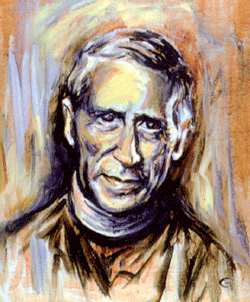On the 50th anniversary of the death of Teilhard de Chardin, S.J., the Jesuit Thomas M. King wrote a short profile for America commemorating the accomplishments of this scientist and priest:
Teilhard was striving for sanctity by working in science, and this effort would require a new understanding of what it means to be holy. The traditional understanding of sanctity regarded secular work as a “spiritual encumbrance” and viewed “the world around us as vanity and ashes.” To come to the things of God required rejection of the things of earth. So says the First Letter of John: “Do not love the world or the things of the world” (2:15). Likewise, St. John of the Cross: “Desire to enter into complete detachment, emptiness, and poverty with respect to everything that is in the world.” Worldly knowledge and secular concerns were thought to lead to pride. “Study to withdraw the love of thy soul from things that be visible, and turn it to things that be invisible,” wrote Thomas à Kempis.
As the 20th century advanced, seminaries still recommended such texts, but most Christians no longer found in them the expression of a human ideal. Nonetheless, when Teilhard’s Divine Milieu was finally published in 1958, the dedication came as a shock: “For those who love the world.”









Teilhard, of course, was not the first Catholic philosopher to observe that activity in the world is good. Throughout the Middle Ages monks throughout Europe strove to copy manuscripts, do laundry, raise cabbage, etc. in a worthy manner. Perhaps Teilhard simply pointed out that the ‘Greek’ West made entirely too much of the body/soul distinction, with the result that Christians lost sight of the fact that each of us is human. We are not angels. God put us here, on earth. We make, build, maintain, and deliver products and services for the benefit of our fellow men. This is called work. It is good. While it is true we physically die, Jesus taught us that, believing in him, death is not final in any way. In fact, we have already entered eternity and we have done so as physical men and women.
I am confident in saying most Catholics are heretics when it comes to this body/soul stuff. They don’t really believe in the resurrection of the body. This is Teilhard’s insight, but my thesis is that it is much less profound insight than commonly thought. After all, we all know that after his resurrection Jesus appeared to his disciples in the upper room and showed them his body and its wounds. Later he cooked and ate fish with them. He demonstrated the existential union of the body and soul, even after death.
Most of us, however, continue to believe we will flit around in heaven like angels. We continue to believe the work we do as humans is make-work, God’s test to sort the sheep from the goats. What we do today really isn’t important—the really important stuff comes later. Baloney, said Teilhard.
As Wisdom says
"From the greatness and beauty of created things,
Their Original Author, by analogy is seen (Wis. 13:5)